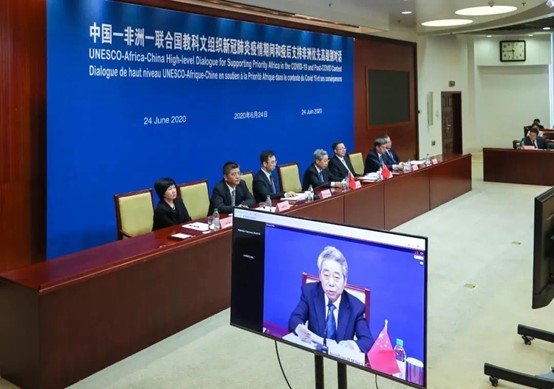 On June 24 2020, the UNESCO-Africa-China High-level Dialogue for Supporting Priority Africa in the COVID-19 and Post-COVID Context (hereinafter shortened to “the dialogue”) was held via video.
On June 24 2020, the UNESCO-Africa-China High-level Dialogue for Supporting Priority Africa in the COVID-19 and Post-COVID Context (hereinafter shortened to “the dialogue”) was held via video.
China's minister of education, Chen Baosheng, attended the meeting and gave a keynote speech. Tian Xuejun, vice minister of education and chairperson of the Chinese National Commission for UNESCO, and Mr. Firmin Edouard Matoko, assistant director-general for UNESCO Priority Africa and External Relations, co-chaired the meeting. Participants of the meeting included ministers of education of several African countries, including Cote d'Ivoire, Egypt, Ethiopia, Mali, Namibia, and Togo, the presidents of Peking University and Xidian University, officials from the Chinese National Commission for UNESCO, high-level UNESCO officials, and heads of UNESCO’s regional offices in Africa. The Open University of China (OUC) also participated in the meeting and gave a speech as a representative of a number of strategic partners.

The dialogue, organised and initiated by UNESCO, was divided into two sessions, “Policy Dialogue” and “Strategic Partnerships for Africa,” with the aim of implementing the spirit of the Extraordinary China-Africa Summit on Solidarity against COVID-19 chaired by President Xi Jinping on 17 June 2020, exchange experience and share practices in the fight against COVID-19, and discuss practical measures to support Africa during and after the pandemic.
Jing Degang, secretary of the Party Committee and president of the OUC, gave a speech at the meeting. He introduced the achievements of the OUC over the 40 years since its foundation, the partnerships it has established with African countries, and relevant cooperation between the OUC and UNESCO. He said that the OUC will follow the spirit of General Secretary Xi Jinping's speech at the Extraordinary China-Africa Summit on Solidarity against COVID-19 and keep in line with the requirements put forward by Chen Baosheng. First, it will set up a training platform for overseas learning centres in Africa as a means of carrying out online education for teacher training. Second, it will provide learning resources and learning support services to open universities in Africa. Third, it will further support African countries in their anti-pandemic efforts and do a good job in supporting open education in African countries after the pandemic.
By Hou Songyan,OUC